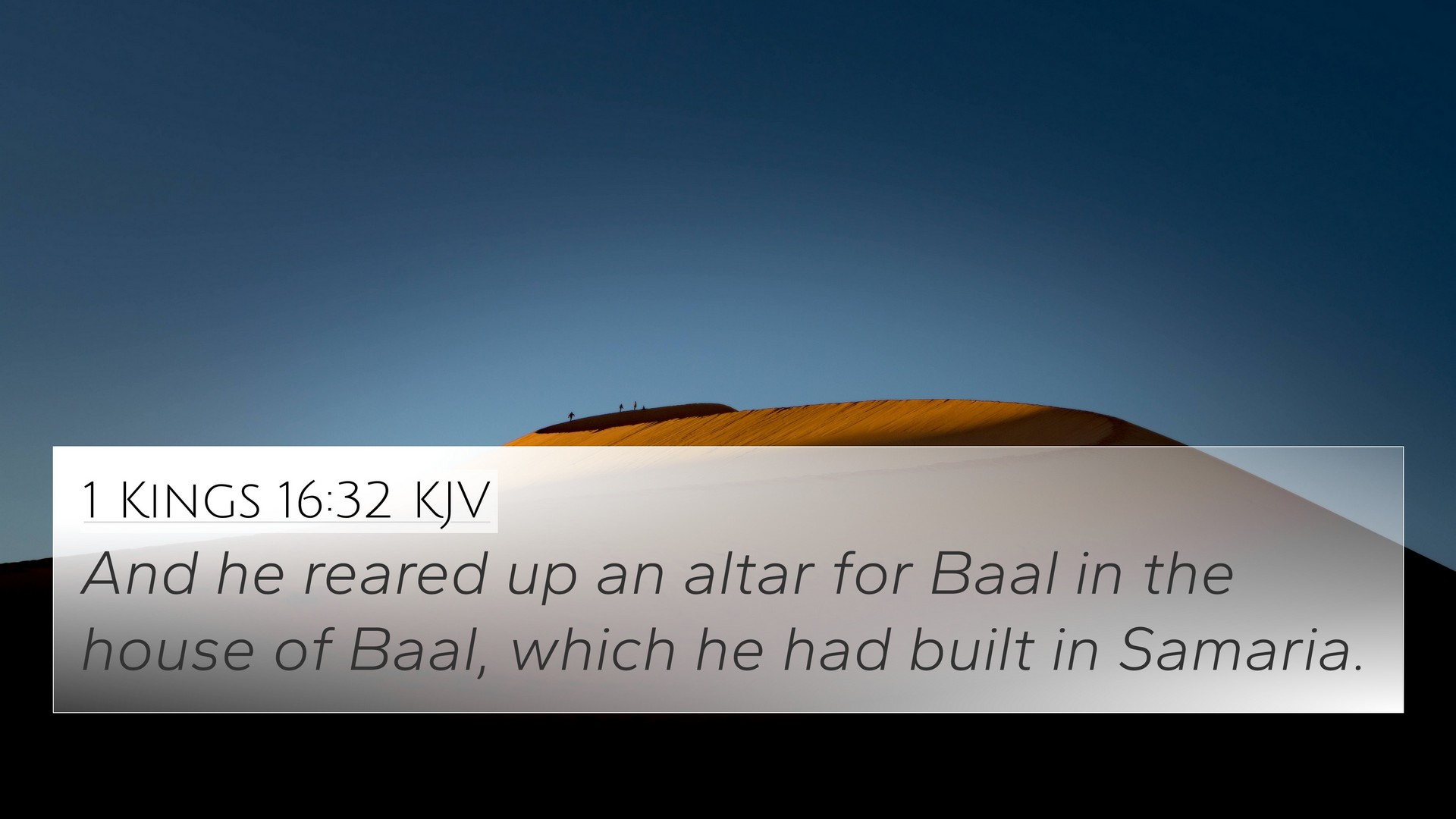Understanding 1 Kings 16:32
Verse: "And he reared up an altar for Baal in the house of Baal, which he had built in Samaria."
This verse presents a critical moment in the narrative of Israel's history, particularly during the reign of King Ahab. It highlights Ahab's actions regarding idol worship and the worship of Baal, which represents a significant deviation from the covenantal faithfulness expected of the kings of Israel.
Commentary Insights
Matthew Henry's Commentary
Matthew Henry emphasizes the severity of Ahab's idolatry. He notes that by erecting an altar for Baal within the region of Samaria, Ahab not only legitimized the worship of a false god but also led the nation into sin. His actions were in stark contrast to the worship of Yahweh, which had been the central tenet of Israel’s faith.
Albert Barnes' Notes
Albert Barnes connects Ahab's actions to the broader theme of Israel’s unfaithfulness. He stresses that Ahab's building practices, particularly with regard to the altar for Baal, showcased the merging of pagan worship with the worship of Yahweh. This is significant as it reflects how far Israel had strayed from its roots and the implications of such actions on the nation as a whole.
Adam Clarke's Commentary
Adam Clarke offers an exegetical approach, explaining the historical context of Ahab's reign, his marriage to Jezebel, and the influence she exerted over him in promoting the worship of Baal. Clarke points out that Ahab's decisions were not merely personal but had national consequences, leading to a period of moral decline among the Israelites.
Key Themes and Messages
This verse serves as a poignant reminder of the struggles against idolatry throughout the biblical narrative. It epitomizes the conflict between true worship and the allure of surrounding pagan cultures. Furthermore, it provides a critical junction for examining how leaders influence the spiritual state of their people.
Cross-References
- Exodus 20:3-5: The commandments against idol worship.
- 1 Kings 18:21: Elijah's challenge to the people of Israel about choosing whom to serve.
- 2 Kings 17:16: The overall decline into idolatry by the Israelites.
- 1 Kings 21:25: Ahab's wickedness influencing the nation.
- Deuteronomy 6:14: Warning against following other gods.
- Romans 1:25: A discussion of exchanging the truth for a lie in worship.
- Acts 7:43: Stephen’s reference to the worship of Molech and the implications of idolatry.
- Jeremiah 19:5: Mention of the idol worship in the valley of the son of Hinnom.
- Hosea 13:2: Condemnation of Israel's practices of idol worship.
- Revelation 2:14: The warning against those who hold to the teachings of Balaam, drawing parallels with Ahab's sin.
Conclusion
1 Kings 16:32 encapsulates vital themes about idolatry, the importance of fidelity to God, and the repercussions of a leader's choices on a nation. Through comparative Bible verse analysis and applying cross-referencing biblical texts, one can see a consistent scriptural narrative warning against the dangers of turning away from God towards false ideologies.
Applying Cross-Referencing in Study
To fully grasp the implications of such verses, scholars and laypeople alike can utilize tools for Bible cross-referencing, such as a Bible concordance or a cross-reference Bible study guide. Understanding how these verses interconnect provides a deeper insight into the broader biblical narrative, supporting the thematic connections between Old and New Testaments.




